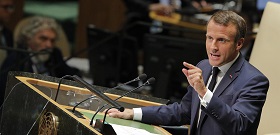Emmanuel Macron’s recent response to Russia’s proposed moratorium on deploying short- and intermediary-range missiles in Europe has caused an uproar. European media was quick to conclude that the French leader effectively supported his Russian counterpart’s idea. The Kremlin voiced a similar interpretation of his statement. Capitals of Central Europe responded with a barrage of accusations against the Élysée Palace, suggesting its current occupant was undermining the unity of the West and was, once again, all too willing to make unjustified concessions to Moscow. Many in the United States were surprised that France was trying to influence the fate of the INF Treaty, which was (or rather had been, before its demise) a bilateral treaty between Moscow and Washington.
Macron had some explaining to do to his American and European partners, NATO Secretary-General Jens Stoltenberg, journalists and experts, and he assured them that France was not really supporting any kind of moratorium. At the same time, his government is not discarding the idea of shaping a “new security architecture” together with Russia and is, in fact, advocating a “transparent, substantive and critical dialogue” with Moscow. “You can’t dismiss what could be the basis for further discussions”, Macron said, explaining his reasoning.
Macron does not want to lose his shot at the now-vacant position of foreign policy leader of Europe, including regarding Russian, which is very important for the European Union. Even less would he wish to surrender the issue of the INF Treaty (with its direct and fundamental bearing on the foundations of European security) to Donald Trump, who has not shown himself to be particularly reliable or benevolent towards Europe.
The French initiative seems to be left hanging. Emmanuel Macron held a meeting with Vladimir Putin on the sidelines of the Normandy Four summit in Paris, but the INF Treaty does not appear to have been discussed in any detail. As any other “deep state,” the French bureaucratic machine is more inclined to sabotage any bold new ideas than nurture them. Time is passing, and the initial shock caused by the dissolution of the Treaty is fading, overshadowed by new problems and new challenges. The United States’ withdrawal from the INF Treaty did not cause an immediate apocalypse and life without the Treaty is becoming part of the “new normal” that both Eastern and Western Europe have been talking about for almost six years.
It would be very disappointing if the interest shown by France in the INF Treaty remained just vague political declarations and rhetoric without any substantial practical output. If I were to advise Macron on foreign policy, I would give the French leader four pieces of advice on how to drive the issue of the INF Treaty, as well as European security in general, out of the deadlock.
Emmanuel Macron’s recent response to Russia’s proposed moratorium on deploying short- and intermediary-range missiles in Europe has caused an uproar. European media was quick to conclude that the French leader effectively supported his Russian counterpart’s idea. The Kremlin voiced a similar interpretation of his statement. Capitals of Central Europe responded with a barrage of accusations against the Élysée Palace, suggesting its current occupant was undermining the unity of the West and was, once again, all too willing to make unjustified concessions to Moscow. Many in the United States were surprised that France was trying to influence the fate of the INF Treaty, which was (or rather had been, before its demise) a bilateral treaty between Moscow and Washington.
Macron had some explaining to do to his American and European partners, NATO Secretary-General Jens Stoltenberg, journalists and experts, and he assured them that France was not really supporting any kind of moratorium. At the same time, his government is not discarding the idea of shaping a “new security architecture” together with Russia and is, in fact, advocating a “transparent, substantive and critical dialogue” with Moscow. “You can’t dismiss what could be the basis for further discussions”, Macron said, explaining his reasoning.
Constructive Uncertainty?
Some ambiguity in French rhetoric regarding the INF Treaty is understandable. On the one hand, the French government has no desire to open a new front of opposition with NATO, whose relations with France are complicated as it is and which has already fully aligned with the US on the INF Treaty. Neither did G7, during its summit in Biarritz, dare attempt to adjust the patently flawed and unconvincing US narrative regarding the preservation of the INF Treaty.
On the other hand, Macron does not want to lose his shot at the now-vacant position of foreign policy leader of Europe, including regarding Russian, which is very important for the European Union. Even less would he wish to surrender the issue of the INF Treaty (with its direct and fundamental bearing on the foundations of European security) to Donald Trump, who has not shown himself to be particularly reliable or benevolent towards Europe.
The French initiative seems to be left hanging. Emmanuel Macron held a meeting with Vladimir Putin on the sidelines of the Normandy Four summit in Paris, but the INF Treaty does not appear to have been discussed in any detail. As any other “deep state,” the French bureaucratic machine is more inclined to sabotage any bold new ideas than nurture them. Time is passing, and the initial shock caused by the dissolution of the Treaty is fading, overshadowed by new problems and new challenges. The United States’ withdrawal from the INF Treaty did not cause an immediate apocalypse and life without the Treaty is becoming part of the “new normal” that both Eastern and Western Europe have been talking about for almost six years.
It would be very disappointing if the interest shown by France in the INF Treaty remained just vague political declarations and rhetoric without any substantial practical output. If I were to advise Macron on foreign policy, I would give the French leader four pieces of advice on how to drive the issue of the INF Treaty, as well as European security in general, out of the deadlock.
Avoid Issuing Ultimata
First of all, it would be unwise to follow the United States in demanding that Moscow completely destroy its controversial SSC-X-8 missiles as a prerequisite for any dialogue about a moratorium on deploying short- and intermediary-range missiles in Europe. It could be insisted that the Russian side provide additional information about this system, and new verification mechanisms could be offered in addition to those that had been provided for by the INF Treaty. The matter of increasing transparency and predictability of Russian missile construction could also be brought up.
Yet the ultimatum that SSC-X-8 be destroyed essentially means that Russia is offered a choice between two clearly unacceptable courses of action. Either Moscow should repent of violating the INF Treaty deliberately and maliciously over the course of many years, willfully trying to conceal these violations from its western partners, or it should declare that it did not violate the treaty – but is willing to destroy a perfectly compliant system just because the Pentagon and NATO do not like it.
We recall that, back in their time, Mikhail Gorbachev and Eduard Shevardnadze took the second path: they did not acknowledge that the Soviet “Oka” short-range missile (NATO designation SS-23 Spider) fell into the category of arms to be destroyed under the INF Treaty, but still agreed to dismantle Oka as a gesture of goodwill. This was a step for which Gorbachev and Shevardnadze are criticised by many Russian experts, politicians and military officials to this day. Everyone who has the slightest idea of the brand of foreign policy pursued by Vladimir Putin will likely agree that the negotiation style that worked with Mikhail Gorbachev thirty years ago will not work with today’s Russian president, especially since the level of trust between Russia and the West is critically low at the moment.
Be an Honest Broker
No one can deprive France of its right to voice concerns about Russia’s compliance or noncompliance with the INF Treaty. For one thing, Russia can be accused of not paying enough attention to the doubts and concerns raised in Washington and many European capitals. Yet it would only be fair if Paris also paid more attention to the concerns and suspicions of the Russian side, even if Quai d'Orsay considers them to be ungrounded and unworthy of serious discussion.
The Russian leadership has repeatedly noted that the Mk 41 missile defence launch systems deployed in Romania and Poland could be used to launch Tomahawk sea-based cruise missiles; therefore they are in breach of the INF Treaty. The US side has bluntly rejected these suspicions, primarily arguing that launch of sea- and land-based missiles requires different software. After withdrawing from the INF Treaty, however, the United States essentially confirmed Russia’s suspicions, conducting Tomahawk tests without much preparation of land-based launch sites.
Sadly, these tests did not elicit any visible response in Europe. Moscow had to draw the logical conclusion that Europeans were not prepared to make an objective and impartial assessment of Washington's actions and could not claim the role of mediators on the INF Treaty issue. It is obvious that Macron would have a much stronger position in his dialogue with the Kremlin if he could pose as an “honest broker” willing to consider the arguments of both parties to the Russia–US dispute.
Look for New Formats
Speaking about a “transparent, substantive and critical dialogue” with Moscow regarding the INF Treaty, it would be helpful to decide what possible format this dialogue could take. That is, of course, if Macron is earnestly aiming to bring this dialogue out of the narrow confines of bilateral Russia–America relations. Using the NATO–Russia Council to launch a discussion on nuclear issues that concern Europe does not appear the best solution at this time. The Council will hardly begin working to the full extent of its capacity in the foreseeable future. For now, it is struggling to make progress even on the much less complicated and sensitive issues of military confidence-building measures on the European continent. It is unfortunately hard to count on the OSCE as a platform for “structured dialogue” either since this platform has not even yet brought about the modernisation of the Vienna document.
This means we need to think about creating a separate ad hoc group in NATO to conduct talks with Russia on the INF Treaty. This group could probably include members of the Alliance that are also members of the “Nuclear Club”, namely the United States, the United Kingdom and France. Perhaps countries that accommodate elements of the US European missile defence system (Romania and Poland) might also be included. When the NATO–Russia Council gains its full institutional capacity, the ad hoc group could be seamlessly integrated into its work.
Another interim solution might be to create such an INF Treaty group outside NATO confines, similar to the European tripartite group of France, the United Kingdom and Germany that was established for the Iran nuclear talks. This option would allow the numerous delays and complications associated with NATO’s cumbersome and complex coordination procedures to be avoided.
In any event, the French leader should be prepared for the new format to not only draw criticism but also meet desperate opposition from those powerful political forces in Europe that will inevitably see it as an obvious attempt to undermine the foundations of Transatlantic unity.
Propose a New Strategic Project
The problem of short- and intermediate-range missiles in Europe, which is once again coming to the fore in European politics, appears impossible to resolve outside the broader context of a new European security architecture. The INF Treaty itself did not appear thirty years ago out of the blue but arose out of Mikhail Gorbachev’s ambitious political project to build a “Common European Home”. Had there been no such project, leaders of the continent’s eastern and western states would have scarcely overcome the resistance put up by the high-ranking military officials and conservative politicians that had risen to their posts over the long decades of the Cold War.
The French leader appears to understand the need to link the INF Treaty issue with the new political project. Yet the only thing Emmanuel Macron has ready for this project so far is the pretty slogan about creating “a common Europe stretching from Lisbon to Vladivostok”. The problem is: slogans have little credibility in today’s Russia. In fact, this precise slogan has already been pushed for the last thirty years, while the reaction of Moscow’s western partners has been sceptical and wary at best, and at worst there was no reaction. So it is only logical that the French President’s statement has not generated much enthusiasm in Russia.
Similarly, Macron’s statements about the need to achieve “strategic autonomy” for Europe are taken with more than a grain of salt. Other European leaders, from Angela Merkel to Federica Mogherini, have convincingly invoked this autonomy many times before Macron, but tangible progress in this direction is yet to be seen. Macron’s idea to tear Russia from “China’s embrace” and return it to the “European family” is also unlikely to find many supporters among the current Russian political leaders.
To win over sceptics, engage the indifferent and inspire hope in enthusiasts, the lofty call to build a new “Greater Europe” must be accompanied by detailed and elaborate blueprints. The name of the project may be changed as work on the blueprints gets underway: instead of the vague contours of a "Greater Europe", we will see, emerging from a thick fog, the imposing stature of a “Greater Eurasia.”








